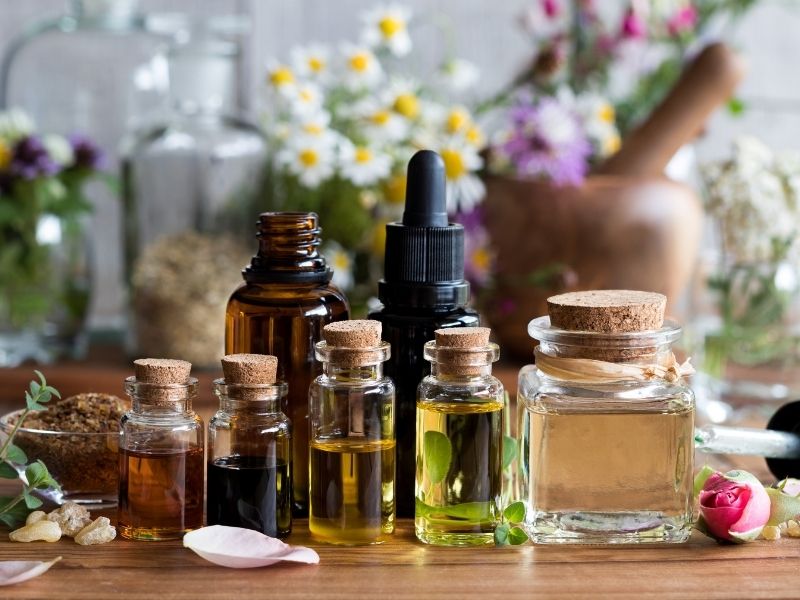Pregnancy is like no other lifestage. Advice will be thrown at you from every person you meet making you feel like this is an impossible task. Not to worry, we are here to give you the science. Remember that before you start using anything in your pregnancy, be it essential oils or a new supplement, always run it past your doctor for the official go-ahead.
Today we aim to clear up the confusion about essential oils and pregnancy. You may be surprised about what we uncovered…
First things first, what are essential oils?
Essential oils are a form of alternative therapy that uses oils extracted from plants to support health and well-being. In aromatherapy, essential oils derive their name from the fact that these oils capture the plants ‘essence’ or in other words, their scent and flavour. Over many years, they have been used in aromatherapy for their beneficial emotional, psychological and physiological effects.

How do we use essential oils?
Essential oils should not be consumed orally, especially during pregnancy. Some essential oils are known to be emmenagogues. This means that when they are consumed, they increase blood flow to the pelvic area and as a result can lead to premature labor or a miscarriage.
Safe ways to use essential oils during pregnancy include through diffusion, topical application and inhalation. Let’s explore these in a bit more detail:
Topical application
This is when you apply the essential oil to your skin either directly/ through massage, in your bath or through a damp compress. It is always advisable to dilute your essential oils with a carrier oil if applying directly to your skin. Not only will this prevent your essential oils from evaporating too quickly, but it will also ensure that the essential oil is sufficiently diluted and is thus less likely to cause skin irritation or a reaction.
For adults it is recommended that you add no more than 3-6 drops of essential oils per teaspoon of carrier oil. Rather start with a low dose and increase as tolerated. Remember not to apply any essential oils to sensitive areas, broken or damaged skin.

Diffusion
There are a variety of diffusers available on the market that use a variety of mechanisms to disperse essential oils into your room (using either water, heat or air).

Inhalation
This is the easiest way to enjoy your essential oils. The essential oils are usually placed onto your hands and then rubbed together and cupped around the nose so you can smell and inhale them. It can also be added directly to a cotton wool ball or tissues. Be careful not to let the essential oils touch your face while you deeply inhale.
When essential oils are inhaled, they stimulate the part of your brain closely linked to your memories and emotions (the limbic system). When applied to the skin, some of the plant chemicals are absorbed. It is thought that a combination of these two mechanisms is what is responsible for the health benefits of essential oils in humans.
There are over 90 different types of essential oils and each one has proposed health benefits. The most popular essential oils include peppermint, lavender and sandalwood.

Can using essential oils be dangerous?
It is important to remember that just because something is natural, does not make it safe. Some of the most common side effects include rash, asthma attacks, headaches and allergic reactions. As we mentioned, it is never advised to consume essential oils (especially pregnant women) as it can be harmful and even fatal.
Can I use essential oils during pregnancy?
As a pregnant woman, various compounds in your environment can be passed onto your baby through the placenta or breast milk. This includes essential oils. There are very few studies examining the safety of essential oils during pregnancy and as a result the majority of healthcare professionals warn that you should rather steer clear of them. For this reason, the majority of research has been conducted during late pregnancy (when the foetus is less susceptible) or during the postpartum period.

What about lavender oil during pregnancy?
As with other essential oils, you should be wary of using lavender oil during your pregnancy, especially in the first trimester when your baby is still developing. Before using lavender oil during your pregnancy (or during the postpartum period) remember to consult your doctor to ensure that it is a safe option for you. As with many products, more studies are needed to confirm safety during pregnancy.
This being said, one study did find that a combination of peppermint, turmeric and lavender oil helped topically treat pruritus during pregnancy. For those of you who don’t know, pruritus is the uncomfortable and irritating sensation that makes you want to scratch that up to 20% of women get during pregnancy. It has been found to affect sleep and quality of life and may even worsen depressive symptoms if not treated. When this blend of oil was used, up to 60% of the participants experienced relief vs 12% of the placebo group.

Lavender oil use during the postpartum period
There has been some research on using lavender oil in the postpartum period that has yielded interesting results. Let’s unpack some of it’s reported benefits. Lavender essential oils may:
Reduce severity of labor pain
Labor pain has been described as one of the most severe pains experienced. With this in mind, it is natural to want to discover ways to reduce the pain, but that is safe to use for both mom and baby. A variety of non-pharmacological approaches have been used in pain management and they aim to reduce not only physical pain, but also accompanying psychological suffering. Certain essential oils, like lavender oil, may increase the secretion of your body’s own sedative, stimulant and relaxing neurotransmitters.
When 0.1mL of lavender oil was mixed with 1 mL distilled water and put on two tissues and inhaled deeply by women in labor, their pain levels significantly improved in comparison to the control group. In addition to this, other studies have also confirmed that the use of aromatherapy during labor can also reduce anxiety in mothers. Reduced pain and anxiety during labor can lead to positive outcomes postpartum.
Assist during episiotomy recovery
An episiotomy is the most common perineal incision during a vaginal delivery and interestingly enough, it’s first documented use was way back in 1742. Would healing after an episiotomy is complex, with antiseptic sitz baths being one of the treatment ‘norms’. Mom’s that added lavender oil to these sitz baths (5-7 drops in 4L of water, cleansing the site twice a day for 10 days) found that redness and inflammation was significantly reduced.
Another study found that women who used lavender oil for perineal healing experienced less discomfort than those who didn’t. The reasons for these improvements can be attributed to the fact that lavender oil is both antibacterial and antifungal.
Reduce pain after a cesarean section
Reducing post c-section pain is in the best interest of both mom and baby, as it can interfere with the well being of both. A study conducted on 200 women (post elective c-section) showed that, in addition to regular pain management, those who received lavender essence through their oxygen masks experienced less pain than those who received a placebo. This has been found to be a safe and easy to perform method that can offer some real benefits.
Help to reduce postpartum depressive symptoms and improve quality of sleep
Stress, anxiety and postpartum depression are the most common psychological problems plaguing women during their postpartum period. Lavender oil has been used in a number of studies to assess if it can be beneficial with regards to improving symptoms, especially in mom’s that who are opposed to using chemical drugs.
This 2018 study used a combination of lavender oil and rose water where the mothers were instructed to add 7 drops of lavender oil to 1 mL rose water, and place this mixture onto a cloth. They put the cloth over their mouths and inhaled 10 deep breaths before sleeping and put it next to their pillow until morning.In the intervention group, depression scores decreased significantly at both their 2 week and 6 week check-up. A study that used the same procedure (but without the rose water) also found that sleep quality improved. Remember that when we don’t sleep enough, we aren’t able to concentrate, are more irritable than usual and may even struggle to perform daily duties. All this is not conducive to a happy postpartum period.
Another study had similar results and found that stress, anxiety and depression scores were lower when new mothers inhaled 3 drops of lavender oil once every 8 hours for 4 weeks. Lastly, this study found that when 5 drops of lavender oil was applied to a cotton ball and inhaled normally for 10-15 minutes per day that pain, fatigue and mood were all significantly improved. All in all, we can see that using lavender oil during the postpartum can have a number of positive effects on mood with very few negative side effects.

Conclusion
Being a new mom is stressful and it is a natural instinct to want to protect this new life that you have brought into the world. Certain essential oils are safe to use during pregnancy and can be a natural and safe way to reduce pain and boost your mood.
Other complementary therapies such as hypnobirthing and meditation like those found in our program ‘Blessed: Hypnobirthing and Meditation for a Positive Birth’ is an easy to use, iPhone app that can be used in combination with essential oil therapy to help you relax and feel rejuvenated and ready to take care of your new bundle of joy!






